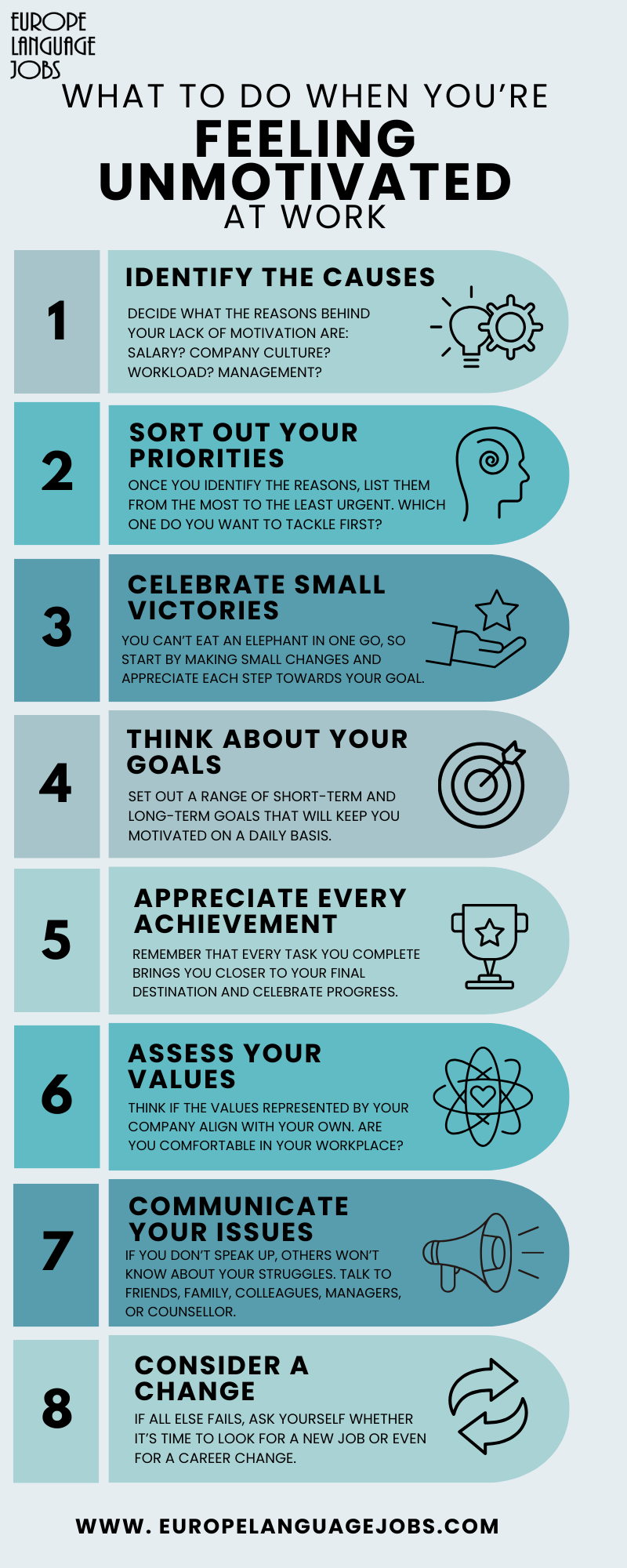Eventually, the time comes for all of us to feel unmotivated at work. It’s completely normal and can happen more than once throughout our career. The road to success is bumpy and it’s impossible to stay fully motivated at all times.
So, feeling unmotivated at work is a very common issue. But it doesn’t mean you should just accept it and do nothing to try to change your situation.
There are many factors impacting our general feeling of motivation. Sometimes, the problem is temporary and will go away on its own. In other cases, you may have to take active steps if it persists for too long.
The important message here is that there are things you can do when you lack motivation. You don’t have to brave through it and wait for the situation to improve on its own.

Is lack of motivation burnout?
First, we have to identify two crucial terms related to this topic. There is a subtle distinction between a lack of motivation and burnout.
The lack of motivation can often be the first step leading to burnout. But feeling unmotivated at work doesn’t necessarily mean you’re experiencing burnout just yet.
It is a signal you should pay attention to and mustn’t ignore. If you act quickly enough, you might not experience the consequence in the form of burnout.
So, in other words, burnout is a more advanced stadium of demotivation. A lack of motivation is just one of the factors leading towards burnout, which in itself is a much more complicated issue.
If we were to compare a lack of motivation to a cold, then burnout would be the flu. If you catch a cold and heal it quickly enough, it won’t transform into a full-on flu. However, if other factors come into play and you neglect basic self-care measures, the mild infection can build up to something much more serious, with long-lasting consequences.
Now you understand why it is so important to take action when you spot the first signs of demotivation. Here is what you can (and should!) do when you feel unmotivated at work:

8 Steps to Take When You're Feeling Unmotivated at Work:
- Identify the causes
- Sort out your priorities
- Celebrate small victories
- Think about your goals
- Appreciate every achievement
- Assess your values
- Communicate your issues
- Consider a change

1. Identify the causes
The lack of motivation doesn’t stem from nowhere. It can creep up on us quite suddenly and surprise us - but there is always a reason.
The first step to fighting demotivation at work is establishing what makes you feel unmotivated. The causes are never-ending: lack of purpose, inadequate salary, too much workload, insufficient work-life balance, no flexibility, toxic work environment, flawed leadership, and many, many more.
All reasons are equally valid and justify feeling unmotivated at work. While the perfect job doesn’t exist and it’s unrealistic to expect your work will be tailor-made to meet all your expectations, you also shouldn’t settle for a position you feel miserable in.
Be honest with yourself. Accept the answer when it comes to you. Surely, you are aware of what bothers you and steals your motivation before going to work every day. All you have to do is admit it to yourself - and to others.
Once you identify the reason, think of what steps you can take to improve the situation. Usually, changes will require the involvement of other people - your colleagues, management, or the boss. Don’t be afraid to voice your concerns out loud.

2. Sort out your priorities
Once you identify what makes you feel unmotivated at work, evaluate the importance of each cause.
Probably, you won’t be able to achieve everything at the same time. If your issues are a strict working schedule and a low salary, it could be risky to try to fix both at once.
Depending on how flexible your management is, you may have to sort out your priorities and identify the biggest thorn in your side. The issue that bothers you the most is the one you should start with.
Is it more important to you right now to be allowed to work from home every now and then, or earn more money? If you come to a meeting with your boss with a list of demands, it is less likely you will be granted any of them than if you lead off by proposing a single change.
Start off slow. Decide what the biggest problem at the moment is, and what can wait. Ask for one improvement now and celebrate its positive impact on your life. Use that small victory to increase your productivity and build arguments to ask for another commodity soon.
If you are granted permission to work remotely twice a week first, turn this improved comfort into improved performance. Using The Freelancer Planner can help you stay organised, set clear goals, and track your productivity while working remotely. Then, after a few weeks or months, prepare a list of achievements you have gained over that time and use them to ask for a raise.

3. Celebrate small victories
Sadly, the more we want, the less likely we are to be satisfied when we achieve one element of our ultimate goal. This is a slippery slope which can easily lead to feeling unmotivated at work.
You can’t eat an entire elephant in one go. Wanting to go from zero straight to one hundred will only build up unrealistic expectations and give you false hope.
Feeling that no matter what happens, it’s never enough is the number one cause of demotivation. You deserve decent working conditions and a job which ticks off your boxes. But you should be realistic about how to approach this.
This is why you shouldn’t wait and take action as soon as you start feeling unmotivated at work. The longer you wait, the more dissatisfied you will be. Your dreams of what reality should be like but is not will grow, and if you don’t start working towards your goal now, later might be too late.
If you don’t communicate your unhappiness when you first notice it, others won’t be aware of it. Stewing in your misery isn’t healthy. Imagine your boss’s surprise when, after months of pretending everything is okay, you suddenly come at them with a list of demands.
Act quickly, start off small and keep steadily striving towards your goal.

4. Think about your goals
Setting goals for yourself is one of the best ways of fighting feeling unmotivated at work. After all, there is nothing that motivates us more than the awareness of working towards something.
Your goals don’t have to align with the ones set out for you by your supervisors. Of course, they should include them, but they do not have to be limited to them.
When planning your goals, make sure to divide them into 2 categories: short-term and long-term. It is essential to have both to ensure you achieve everything you set out to do.
Create a mix of ambitious and realistic goals. The bigger ones should consist of little steps that will help you reach the final destination.
If you set a goal which seems too complicated, you will never complete it. And, as a consequence, you will feel even more demotivated.
Don’t shy away from ambitious goals, but create a range of smaller ones you can achieve on a daily basis. It will give you frequent reasons to celebrate, and make achieving your final goal seem more manageable.

5. Appreciate every achievement
When we feel unmotivated at work, we are often under the impression that nothing we do makes a difference. We slowly lose sight of what once drove us and fail to see the impact our work has on others.
In moments of weakness, remember that if your job was redundant, it wouldn’t exist. Nobody is interested in paying people for useless work.
If you keep doing your job, it means there is someone out there who benefits from it. Maybe it directly helps someone, or maybe it makes somebody else’s work so much easier.
When you define your goals, it is easy to overlook the ones which seem smaller. Especially if you have been feeling unmotivated lately, it is natural to seek that rush coming from achieving something big.
But Rome wasn’t built in a day. Remember that each task - no matter how small - brings you closer to achieving the ultimate goal. Skipping steps along the way will only delay the process.
Allow yourself to be happy after every achievement. Reward yourself for the progress you make, and keep your eyes on your final destination.

6. Assess your values
The lack of agreement between personal values and the values represented by a company is one of the most common causes of feeling unmotivated at work.
Values may seem like an insignificant element of your professional life. After all, we mostly hear about money, status, and progress as indicators of success and happiness.
But being stuck in a workplace which doesn’t reflect your personal values can be very draining. Imagine prioritising flexibility and work-life balance when your employer doesn’t support hybrid working and expects you to do overtime every single day.
Similarly, if you are a driven ecologist, working for an oil drilling company may be in conflict with your beliefs. A workplace full of prejudice - sexism, homophobia, xenophobia, etc. - is not the perfect working environment, either.
Of course, we do not always have a choice if we are pressed to quickly find a new job. Our values also can (and will) change with time. Where we used to be in agreement with the company’s policy, it could rub you the wrong way now. Some elements of the company culture could have been hidden, and only come out after you have worked there for a while.
This is why it is important to take your values into consideration when you start feeling unmotivated at work. Many overlook this aspect, while in truth, it is a very common and valid reason that should be addressed.

7. Communicate your issues
Mind-reading (sadly) only exists in science fiction films. If you don’t communicate your pains out loud, people won’t be aware of them.
Of course, your colleagues and management will notice something isn’t right when you feel unmotivated at work. Don’t expect you will be able to hide it, because, unfortunately, there are tell-tale signs which will give you out sooner or later.
However, while others may realise there is a problem, they won’t know the details until you share them. Co-working with someone who is perpetually grumpy is no joy for other employees, either.
If you don’t feel comfortable bringing up topics like this, start off small. Talk to a friend or family member. Then ask a trusted colleague for advice. Move on to have a chat with your manager. They will be able to help you arrange a meeting directly with your boss.
Assess the scale of your issue. The boss won’t always have to participate. If the problem is a colleague who frustrates you, approach them directly. If that doesn’t help, turn to your manager.
If the reason is a general discomfort or inappropriate management style, go straight to the manager. If it’s about your salary or working conditions a conversation with the boss may be unavoidable.
Such topics are hard to discuss. But in moments of hesitation, remember that it’s your comfort at stake.
Feeling continuously unmotivated at work may quickly lead to burnout. Addressing the issue - although difficult - is still the best way to improve your situation and regain motivation.

8. Consider a change
If all else fails, it might be a sign to ask yourself the challenging question: is it time for a change?
If setting goals for yourself doesn’t help, if you discover your values don’t align with your employers’ and there is nothing you can do about it, or if talking to your boss brings no results - it could be the time to quit.
Bear in mind - you should consider quitting the very last resort. You shouldn’t hand in your two weeks’ notice the moment you start feeling unmotivated at work. It may be temporary and go away before those two weeks are even up.
If the feeling pertains, take steps towards fighting it first. Try all the steps mentioned earlier and only if none of them work despite multiple attempts - only then make the decision about quitting.
Once you come to a conclusion this is the right thing to do, ask yourself another question: will changing employers help, or is it my job that is the problem?
Career change is a challenge, but in many situations, it can also be a true lifesaver. It is much better to combat the difficulties of changing careers than to remain feeling stuck and unmotivated in your current one.
An average employee is expected to change careers at least 7 times in their lifetime. So, despite popular belief, a career change isn’t something unattainable.
Feeling unmotivated at work shouldn’t remain ignored. The longer you pretend it’s not there, the more the problem will grow. There are things you can do to try to eradicate this issue, so don’t hesitate to take action.
If you don’t see any improvement despite your efforts, consider consulting a specialist. A counsellor could help you understand your feelings and motivations, and assist you in crafting a plan.
And, above all, remember you are not alone in this. We all feel unmotivated at work sometimes, and there is always someone you can turn to who can understand you - a friend, a family member, a colleague, a manager, or a counsellor.
We spend roughly a third of our lives at work. We deserve to spend that time feeling happy and motivated.
Feeling inspired? Visit our blog for more career advice! How can you be sure the information we provide is top-notch? We are a group of professionals working with recruiters, career coaches, and HR specialists from all over the world!
Trust our experience and let us help you find a new job in Europe!























Αλέξανδρος Ντούνης 1y ago
Καλο
Καλο